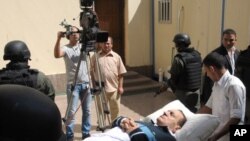An Egyptian judge has summoned the head of the ruling military council and several other high-ranking officials to testify at the trial of former President Hosni Mubarak.
The judge on Wednesday ordered Field Marshal Mohamed Hussein Tantawi to testify in a closed session set to begin on Sunday.
Tantawi served as Mubarak's intelligence chief. Earlier this month, the former president's lawyers requested that Tantawi testify. They argued that he effectively "took control" of the country after January 28, when troops were deployed to Cairo to disperse anti-government protesters.
The judge has also summoned officials that include former Vice President Omar Suleiman and Lieutenant General Sami Enan to testify in closed sessions next week.
Prosecutors say Mubarak ordered the killing of 850 protesters during the uprising that led to his February resignation. He has pleaded not guilty to charges. He is also accused of corruption and abuse of power.
Mubarak arrived in the Cairo courtroom Wednesday on a stretcher, just as he has for previous sessions during which he lay on a bed inside the court's large metal cage.
In another development, Egyptian authorities detained a prosecution witness on charges of perjury after he allegedly changed his story concerning the use of live ammunition on protesters.
Officials said Wednesday that police chief Mohammed Abdel-Hakim denied any knowledge of security forces being equipped with live ammunition in late January as they tried to crack down on dissent. But prosecutors say Abdel-Hakim had previously stated that he knew live ammunition was used.
At Monday's court session, a top police official said he was not aware of any order to shoot live ammunition at protesters. Prosecution lawyers were visibly stunned by the testimony from General Hussein Moussa, which bolstered claims by Mubarak's backers that he did not orchestrate the violence.
Prosecutors accused Moussa of changing his story from the affidavit he had initially submitted to the court.
Mubarak is being tried along with former interior minister Habib al-Adly and six deputies.
Some information for this report was provided by AP, AFP and Reuters.




